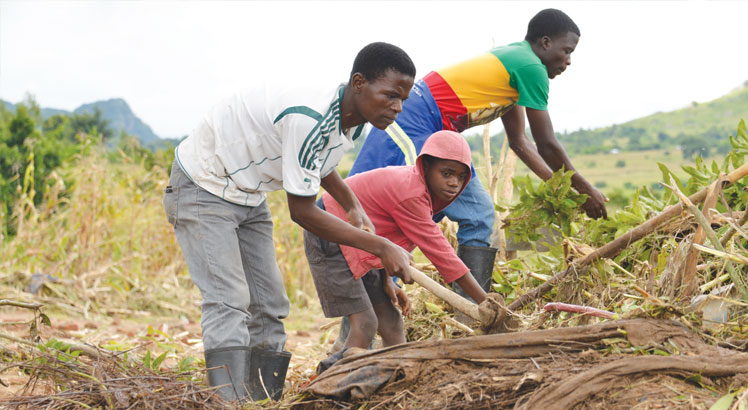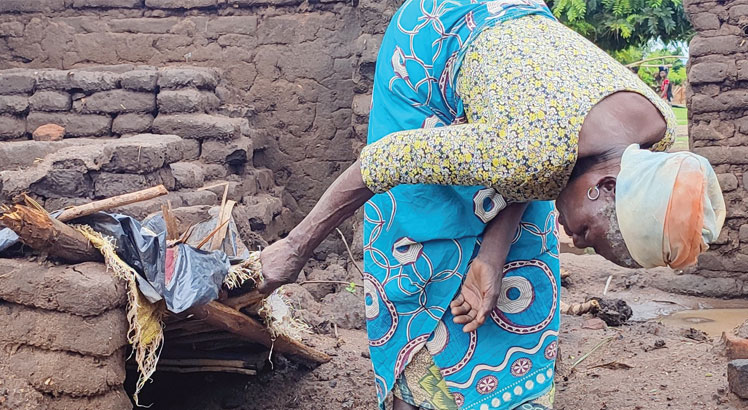Cyclone Freddy is gone but the talk about him continues. The devastating impact on human lives, environment and infrastructure is deep with most affected households facing multiple layers of the shock.
It is three days since the Department of Climate Change and Meteorological Services announced that the cyclone had dissipated but figures of fatalities continue rising as more bodies are being retrieved from the mud and elsewhere.
However, checks in some affected areas indicate that the full impact of the cyclone, which developed over the Indian Ocean more than a month ago, is still emerging.
While all efforts are focused towards helping survivors, there is very little on the ground on resettlement plans
since response operation was established by government and other stakeholders.
Further, the extent of destruction remains unclear although first-hand information provided by the locals and survivors paint a gloomy picture of the cyclone’s after-effects.
Since the disaster struck in Blantyre on Monday, government officials and other partners have put their weight behind survivors in the city with several other affected areas in Southern Region yet to receive a single relief item.
Villagers search for their relatives in Ntauchira Village in Chiradzulu
Some, especially in Mulanje, Nsanje and Phalombe had stayed for five days with rescue missions only coming two or three days after the disaster struck.
But the story is different for what used to be Ntauchira Village in Traditional Authority Likoswe, Chiradzulu where government rescue workers are yet to reach.
This is despite government announcing that K1.6 billion had been released for the Cyclone Freddy survivors.
Our calculations indicate at least K1.4 bilion extra has been donated by various stakeholders since the disaster struck.
On Thursday, during the daily cyclone briefing, Dodma commissioner Charles Kalemba conceded facing challenges to reach out to survivors with relief items “largely due to accessibility challenges”.
At Manja in Blantyre, one of the hugely-affected areas, young men from the area took it upon themselves to search and retrieve bodies before they were joined by the Malawi Defence Force (MDF) and, later, Malawi Police Service (MPS).
From Tuesday to yesterday, over 30 bodies were recovered.
The MDF had been using a drone to locate the bodies while MPS deployed police dogs in three teams.
National Police spokesperson Peter Kalaya, in an interview yesterday said the dogs were sent out for the operation Thursday night.
“The dogs will be there until when we are done with the operation. As we speak, they have sniffed out nine bodies. They are currently at Manja, but they will be dispatched anywhere else where there is need for the operation,” he said.
Yohane Chamveka, 28, whose family of eight survived the cyclone at Chilobwe in Blantyre and is currently accommodated at Good Samaritan Evacuation Camp, grieved over life after the disaster.
He said: “We are being provided with almost everything here but what will happened thereafter because we will not be here forever. Most survivors here lost their houses and all the property.
“We will have to go back and restart our lives but none of the government officials or other partners is talking about the aftermath of the storm.”
Most survivors are being accommodated in public schools as temporal refuge, but according to the Ministry of Education, these schools are scheduled to open on Monday.
Education activist Benedicto Kondowe, in an interview yesterday blamed government of lacking a clear plan on handling the survivors and prepare the schools before children go back to their classes.
“As stakeholders we are worried that the longer it takes for government to move out these people, the more learners in the affected schools are bound to underperform in their studies, including the forthcoming Standard Eight national examinations,” said Kondowe.
He said government should have, by now, considered putting up tents elsewhere as temporal measure for the survivors while exploring for sustainable housing.
“In our view that that could help to protect the affected children’s right to education because as time is running out, other schools will be way ahead,” he said.
Malawi Red Cross Society secretary-general McBain Kanongoza, in another interview on Thursday, said while the disaster was still developing, with the processes of search and rescue continuing, there was need to attend to immediate needs.
He said: “There are stages in terms of disaster implementation. There will be a moment when those in the camps will need to be settled. It’s a very complex situation when it comes to resettling them.”
He suggested the need for a law to establish the disaster fund that would help in times of disaster response because “the country is still hugely challenged”.
But director of preparedness and response at the Department of Disaster Management Affairs (Dodma) Moses Chimphepo said the department was still undertaking the operations to rescue people in areas where people are cut off such as Phalombe, Nsanje and Mulanje.
Meanwhile, President Lazarus Chakwera yesterday continued visiting displaced people when he toured the Lower Shire .
Later in the evening,the President updated the nation on the status of the disaster saying that the number of those affected had risen as follows: fatalities from 326 to 360 ; missing persons from 201 to 282 ; displaced persons from 182 159 to 189 579 and holding camps from 370 to 487.
He also acknowledged receipt of relief items from various well-wishers from within and outside the country.
The President reiterated the call for Malawians to unite in assisting the survivors, which he made when he cheered up the people at various centres earlier in the day.
He said what had occurred in the country was a national disaster, as such there was need for Malawians to unite and help the survivors.
He also repeated the assurance that the affected would get the necessary support from government and other well-wishers.
The post Counting the cost first appeared on The Nation Online.
 Moni Malawi
Moni Malawi 

